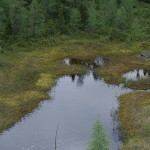To peat or not to peat
Posted on October 10th, 2012 by Andy

Peat bog. Photo courtesy of peupleloup via Creative Commons License.
The New York Times recently covered the controversy brewing in Great Britian over the use of peat in gardening. As the newspaper reports, the British government drew some fierce criticism from both sides after it announced plans to gradually eliminate peat from all gardening products. Gardeners love the stuff (it’s spongy, airy, improves soil structure, holds water without being soggy; and it is widely used in potting soils, planting mixes and as a soil amendment). But environmental critics say the practice of harvesting peat isn’t sustainable. Peat “is scraped off the tops of centuries-old bogs, which are vital ecosystems that also serve as natural stores of carbon, just like rain forests,” the Times reports.
Most of the peat used in the U.S. comes from Canada. Its use is no less controversial here, though there doesn’t seem to be any effort afoot to ban the product.
At Western Washington University, professor Linda Chalker-Scott makes the argument for why peat moss isn’t a sustainable resource. She writes that peatlands play an important role in the environment. Like wetlands, she says, peatland systems store and help purify water; and they’re the single largest terrestrial store of carbon. While natural, peat can often take centuries to replace.
Cornell University’s Department of Horticulture, however, suggests that it’s OK, if you use it conservatively. The department recommends using peat for starting seeds and cuttings because it minimizes disease problems. But it says it’s a better idea to turn to compost and manure for larger quantities of organic matter in your garden.
Chalker-Scott writes that there are a number of suitable substitutes for peat. Compost is the best known substitute. Coir, or coconut dust, is also another suitable alternative, according to Oregon State University. Coconut “peat” is usually the short fibers of the coconut husk; the longer fibers are removed and used for doormats, brushes and ropes; the short fibers often end up in horticulture products. According to OSU, researchers at Auburn University and University of Arkansas compared peat and coir as soil amendments for gardening and found that coir performed as good as peat. Coir can hold moisture and wet, similar to peat.
Filed under:Seattle Landscape Design, Seattle Landscape Maintenance, Vegetable Gardening | Permalink |



